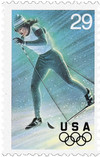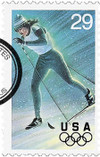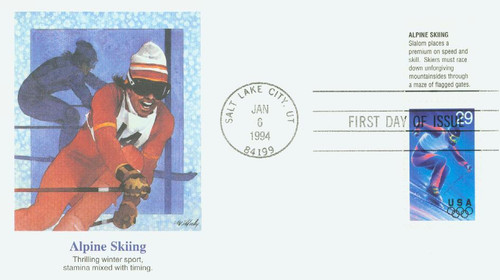
1994 29c Winter Olympics: Cross Country Skiing
# 2810 - 1994 29c Winter Olympics: Cross Country Skiing
$0.90 - $3.20
U.S. #2810
29¢ Cross Country Skiing
Winter Olympics
29¢ Cross Country Skiing
Winter Olympics
Issue Date: January 6, 1994
City: Salt Lake City, UT
Quantity: 35,800,000
Printed By: Ashton-Potter
Printing Method: Lithographed
Perforations: 11.2
Color: Multicolored
City: Salt Lake City, UT
Quantity: 35,800,000
Printed By: Ashton-Potter
Printing Method: Lithographed
Perforations: 11.2
Color: Multicolored
An important means of transportation, cross-country skiing dates back thousands of years. The term Nordic refers to northern Europe, where in countries such as Sweden, Norway, and Finland, cross-country skiing is still a practical means of travel in the winter.
During the 1900s skiing gained popularity both as a recreational and a competitive sport. And in 1924, Nordic competitions were included in the first Winter Olympic Games. A grueling test of strength and endurance, cross-country racing requires courage, determination, and stamina.
Like Alpine skiing, Nordic skiing also consists of several different contests: cross-country races, relays, jumping, and the biathlon. Cross-country races take place on a course that is equally divided between uphill, downhill, and flat surfaces. Skiers race against the clock - the one with the fastest time wins. Relays are team competitions, where each member of the team races an equal distance. Jumping, a popular spectator sport, often attracts up to 200,000 spectators. Contestants receive points for both the length of the jump and the style with which it was executed. The biathlon combines cross-country skiing with riflery as skiers shoot at targets set up along the course.
U.S. #2810
29¢ Cross Country Skiing
Winter Olympics
29¢ Cross Country Skiing
Winter Olympics
Issue Date: January 6, 1994
City: Salt Lake City, UT
Quantity: 35,800,000
Printed By: Ashton-Potter
Printing Method: Lithographed
Perforations: 11.2
Color: Multicolored
City: Salt Lake City, UT
Quantity: 35,800,000
Printed By: Ashton-Potter
Printing Method: Lithographed
Perforations: 11.2
Color: Multicolored
An important means of transportation, cross-country skiing dates back thousands of years. The term Nordic refers to northern Europe, where in countries such as Sweden, Norway, and Finland, cross-country skiing is still a practical means of travel in the winter.
During the 1900s skiing gained popularity both as a recreational and a competitive sport. And in 1924, Nordic competitions were included in the first Winter Olympic Games. A grueling test of strength and endurance, cross-country racing requires courage, determination, and stamina.
Like Alpine skiing, Nordic skiing also consists of several different contests: cross-country races, relays, jumping, and the biathlon. Cross-country races take place on a course that is equally divided between uphill, downhill, and flat surfaces. Skiers race against the clock - the one with the fastest time wins. Relays are team competitions, where each member of the team races an equal distance. Jumping, a popular spectator sport, often attracts up to 200,000 spectators. Contestants receive points for both the length of the jump and the style with which it was executed. The biathlon combines cross-country skiing with riflery as skiers shoot at targets set up along the course.











